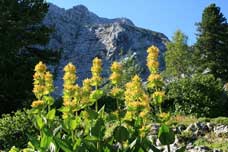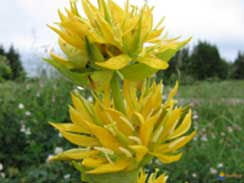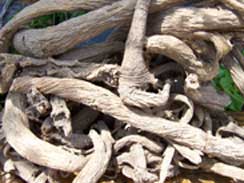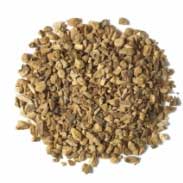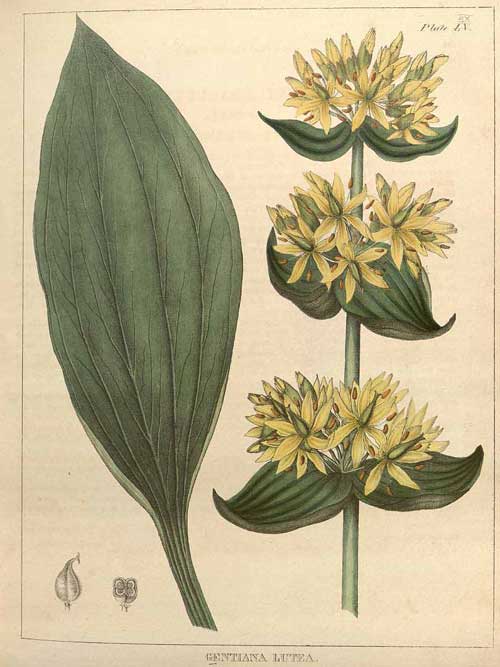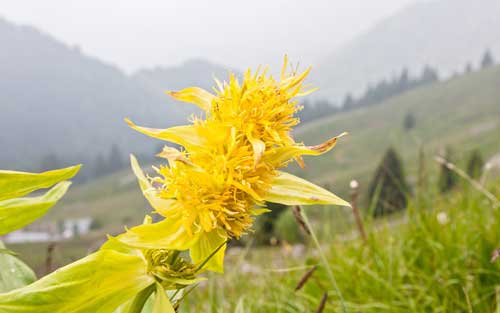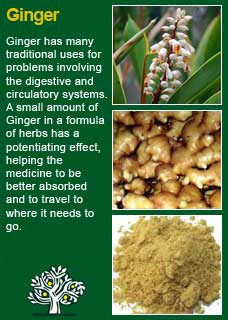
|
|
||||
| Our Pages ABOUT CONSTITUTIONAL MEDICINE
|
The roots and root branches of Gentian, a long-living herb that grows a slender stem to over a meter that produces blue-green leaves and yellow flowers in bowl shaped clusters.
The ancient Egyptians, the Greeks, the Romans and the Arab physicians of the middle ages all used Gentian as a digestive tonic. They also widely used Gentian for liver disorders, an antiseptic wound wash, and as a treatment for intestinal worms. Avicenna, in his Canon of Medicine, one of the most influential medical books in history, writes of Gentian as 'a deobstruent for spleen and liver obstructions, the administration of its root rectifies the stomach ailments attributed to coldness' Gentian has been very widely used in herbal medicine for people who have chronic health troubles where a weakened digestion is involved. King's Dispensatory writes 'Gentian is a powerful tonic, it improves the appetite, strengthens digestion, gives more force to the circulation, and slightly elevates the heat of the body. Used in cases of debility and exhaustion, and in all cases where a tonic is required, as dyspepsia, gout, amenorrhoea, hysteria, scrofula, intermittent diarrhoea, worms, etc. Tincture of Gentian was prized by Prof. Scudder as one of the most efficient remedies for "atony of the stomach and bowels with feeble or slow digestion" Gentian is valuable to relieve irritation and increase the appetite after protracted fevers, where the powers of life are depressed, and recovery depends upon ability to assimilate food' H Felter writes 'Gentian is especially useful in anorexia, in the dyspepsia of malarial origin, and in subacute gastritis and intestinal catarrh. The chief use of gentian is to promote the appetite and improve digestion in states of chronic debility. This it does when given in moderate doses. For atony of the stomach and bowels, with feeble or slow digestion, it is an ideal stimulating tonic; and after prolonged fevers and infections, when the forces of life are greatly depressed, and recovery depends upon increased power to assimilate foods, gentian may be used to improve gastric digestion and thus hasten the convalescence' WM Cook writes 'Gentian root is one of the purest bitter tonics, intense and permanent in taste and action, with a distinct share of relaxant properties, but the stimulant quality predominating. It is generally well received by the stomach, notwithstanding its extreme bitterness. It actively promotes appetite and digestion, braces the circulation slowly but effectually, and gives firmness to the stomach, intestinal canal, gall-ducts and uterus. It is best fitted for languid conditions, and states of general debility: under which circumstances it is one of the most serviceable of all our tonics–not only for passive forms of indigestion, but in chronic biliousness, amenorrhea, constipation, worms, and other maladies incident to general feebleness of the tissues. It slowly promotes the action of the bowels, and has proven of much service for the period of remission in agues' (illnesses that involved fever and shivering) Rudolph Weiss writes 'Gentian makes heavy foods easier to digest by stimulating gastric juice secretion and stomach motility and by improving the muscle tone of the stomach... stomach complaints which are achylous (lacking juice) and atonic (lacking strength) are the primary indications for Gentian'. Maude Grieves writes 'Gentian is one of our most useful bitter tonics, especially in general debility, weakness of the digestive organs or want of appetite... it is one of the best strengtheners of the human system'. Thomas Bartram describes Gentian's as the 'King of Tonics' and calls it a 'digestant, appetite stimulant, liver & pancreatic stimulant, sialagogue (increases saliva) anti-inflammatory, anthelmentic (expels worms) he says it is indicated for feeble digestion in the elderly from gastric acid deficiency, thin people anxious to put on weight, jaundice (it promotes the flow of bile) nausea, vomiting, travel sickness (with or without Ginger) bitter taste in mouth, diarrhoea with yellow stool, malaria (as substitute for quinine) post-viral syndrome, severe physical exhaustion and to antidote some types of food poisoning (salmonella, shigella etc.) In early 20th century slang 'Moxie' meant courage combined with recklessness. Some of the most highly regarded people of the time such as Teddy Roosevelt and Charles Lindberg were said to have plenty of 'moxie'. This term came from a strongly flavoured soft drink available in New England from the 1890s that was itself called 'Moxie' It was touted as a cure-all and owed its virtue to being made with Gentian! Other traditional uses for Gentian that continue to this day include:
~ A Chevallier writes 'although present in much smaller quantities than one of Gentian's other bitter principles, gentiopicroside, amarogentin is the constituent largely responsible for the bitterness of Gentian. IT is 3,000 times more bitter than gentiopicroside and, tasted at dilutions of 1:50,000, it is possibly the most bitter substance on the planet!' ~ Gentian was given in a clinical study to 205 patients in a dosage that was equivalent to 600mg of the root per day. Rapid relief of symptoms such as abdominal pain, nausea, heartburn, flatulence, constipation, appetite loss and vomiting was achieved (Wegener T: Z Phytother 19:163-164, 1998) ~ In an experimental model Gentian was shown to stimulate the secretion of enzymes in the small intestine and there was a marked increase in gastric secretion with its acid and pepsin content when Gentian was given by mouth (Kazakov BN, Cited in Scientific Committee of ESCOP monographs: Gentianae radix, UK, July 1997) ~ In healthy volunteers, Gentian extract produced a significant increase in salivary secretion from 1 to 30 minutes after oral administration and in a similar study a single dose of Gentian (equivalent to about 20 drops of a tincture) stimulated gastric secretion, release of bile from the gall-bladder and bile production by the liver (Borga M et al: Curr Ther Res 29(3):525-536, 1981) ~ The authors, titles and the 'where-and-when' published of over 40 further studies and articles on Gentian are listed in a PDF found here
The main point about safety with Gentian to know is that more is not better with this herb! Taking too much will quickly cause an adverse reaction, typically something like nausea, or a headache, or an upset bowel. We do not ever see this in practice in dosages such as those described below but it is nevertheless a powerful herb that needs to be treated with respect and an understanding that, even at safe and low doses, it may only be wanted and needed by the body for a finite period of time.
For some years now, against this proven and safe way of herbalism, there has been a rising tide of excessive caution and scare-mongering in many parts of the world. The same authorities that, not so long ago, decried herbal medicines as ineffectual, have now taken up a different adversarial position; that they are dangerous substances that should only be prescribed by Doctors, who of course have zero training in them. Unfortunately, the same unnecessary fear and worry has crept into many natural health websites and popular publications on herbs. Herbs that we have safely used for thousands of years, that have no reports of adverse reactions in the medical literature despite widespread use by millions of people, are suddenly described as contraindicated because of something that should have been seen as completely unimportant, or at the utmost a merely theoretical concern, such as a laboratory study on one of the herb's constituents to use an all too common example. I wonder sometimes if the writers of such articles feel that the herb will be more deserving of respect if it is thought to be a little bit dangerous, in other words more like a drug than something that has simply come out of the earth and been used by ordinary people for generations beyond count. There is just so much misinformation about herbal medicine on the internet now. Ludicrous claims and cautions abound in equal measure; it seems like one group are trying to make money out of the public whilst the other are busily trying to scare them off. I have to believe that the kind of reader who takes the time to read pages on herbs that are as extensive as this one is much less likely to be swayed by marketers or misinformers. I hope that you will keep your wits about you if you get conflicting opinions from people who have never really got to know these herbs, who have never worked with them, or learned how to use them safely and effectively. I want to remind you that the reason that herbs can never be patented and owned by any individual or corporation is because they are, and always will be, the People's medicine. They belong to all of us and it is my great hope in sharing this work that you will learn how to use them wisely for yourself, and the people you care for. Be safe, but do not be afraid.
Gentian is a herb with which I have developed a tremendous amount of respect and affection because I have repeatedly seen how it can: I frequently prescribe Gentian in the early stages of my work with many different kinds of patients. Although they may have quite different conditions they share the common ground of a weakened or stressed digestive system and I know that if I can rapidly improve that gut function, something Gentian is highly likely to help do, their progress with whatever else they have come for is going to be so much the faster. For this particular herb, in the last section called 'Constitutional Notes' I have shared in much more depth than usual about the kinds of ways I might use Gentian with different people from different constitutions. I have students of herbal medicine in mind when I have written this material, but also the person who has wholeheartedly turned towards Nature for the help they need but cannot consult with an experienced practitioner in person. If there is one digestive herb that such a person might need to know and know well, it is Gentian! However, if all you need at this point is a reliable, tried and tested recipe then I firstly share a classic - the Gentian and Ginger formula. As you will see, much of the art to harnessing the power of this herb is in the way you take it and this vital information is shared in practical detail alongside.
As soon the Gentian & Ginger formula enters your mouth you will start stimulating the flow of digestive juices right throughout your system. You can immediately feel this for yourself in how you will start to produce more saliva in your mouth. Scientific studies showing how we have bitter taste receptors throughout our body, along with countless experiences throughout history, show that the same increase of 'juice' you can feel in your mouth is likewise happening all along the digestive tract. When you throw down 'logs' of food to a person with poor digestion they sit there heavy, smouldering. undigested. In this analogy, the action of the Gentian is to blow into the fire, to get it burning brighter before eating, activating a healthy appetite and good digestion to follow. You must taste the bitterness of the herb for the action to work. If a person can take their drops of tincture straight, so much the better. If they can let it stay in their mouth for a few moments before swallowing, better still. If they can swill it around for a moment before swallowing, then best of all. However, if the taste is just too intense, dilute it with water, the more you dilute it, the less intense. It is noticeable that once people have taken Gentian a few times, they usually say it gets easier to take. This is not because it gets bitter, in fact as people get used to it they tend to dilute it less, so it actually tastes stronger. What is happening is a change in consciousness whereby the instinctive repulsion to bitterness is gradually replaced by a deeper experience of what is happening within... as the food is digested better and the liver, stomach and pancreas all start to function better the brain starts to both receive and send some clear messages -- 'this stuff works, it's really not that bad, let's have some more!' The only person who can truly answer how long to use Gentian for is the person taking the treatment. This is a herb that begins working the first time you take it and, for many people, once the 'fire' of digestion starts working properly, it will keep going by itself and we can stop blowing on it before we eat. The only way to know for sure is to stop the treatment and see if anything worsens. If after stopping, the appetite decreases, or tiredness, inflammation, sugar cravings or indigestion increase, the body is sending the clear message 'I still need more, keep going!' It is a crude method, but we do this with a great many remedies because it's honest and it works. Even when it is no longer needed, once a person has felt its benefit and is in no doubt to its efficacy, most will like to have some Gentian formula at home for any rough patches that may come in the future. The tinctures do not go off and the tiny doses required make it a most economic treatment if it ever needs to be repeated.
If we know something about the person who is going to be taking it, there are a number of ways that the potent action of Gentian can be enhanced Much of the information here about the traditional uses of Gentian is consistent with the model of thinking whereby one may treat problem A with plant B. There is value in this approach, especially in how it helps us pass on useful knowledge to one another, but it falls short in one vital area; and that is that people are not all cut from the same cloth! People vary in their constitutions as to whether they are either hotter or cooler and, at the same time, either dryer or damper. This interesting and useful subject is introduced further here
In such instances, I may well use the Gentian in combination with some potent liver and blood cleansing remedies and have the Tiger person take the remedy two or three times a day for a month along with a clean diet and then review the results, which are usually most gratifying to all involved. An example of a typical simple formula is
To make 50mls of fluid extracts or tinctures. Dosage would be typically 20 drops twice a day before food or 12-16 drops three times a day before food. A good 5 minutes or so before eating to allow the action to penetrate deeply. The cleansing diet is written up here The kind of treatment I might use if a person already had some significant health troubles and we wanted to use as strong an approach as possible might like something like this:
To make 540mls of fluid extracts or tinctures (which will easily fit into a 500ml amber pharm round) The maximum dose of this would be 10mls twice a day. Most Tigers will more than survive that strength, they can positively thrive on it! Most treatment courses like this one only need a month, there are exceptions to that though, especially if the skin is involved. The dose can of course be adjusted down for a smaller or more sensitive person. Much of the art of good herbal medicine lies in this vital matter of dosage, here I am only sharing experience by way of examples, I cannot make any recommendations to a person I have not met and it is entirely possible, even likely, that a formula of this strength would provoke what we call a 'healing crisis' where things get worse before they get better. This important subject is discussed in more depth here
The hotter and dryer 'Eagle' can respond especially rapidly to Gentian. Many suffer from allergies, and Gentian can significantly reduce the system's hypersensitivity by channelling energy into digestion rather than reaction. Gentian can also help in a mind/body manner for an Eagle who has become too 'heady' with symptoms such as insomnia or overthinking where it can have a calming, centering effect. Gentian is a herb that 'pairs' particularly well. This means it gets into combinations where each herb noticeably augments the action of the other. For example, for reactive immune conditions in the Eagle I might use something like Gentian 30mls with either Feverfew 20mls or Limeflowers 20mls and then recommend small frequent doses until things were much improved. Or for another example, to settle the nerves and centre energy, Gentian could likewise be given with Kava, or Motherwort, or Skullcap, except in these cases I would turn the ratio of the pair the other way, i.e. this time the Gentian at the 20mls and the Kava, Motherwort or Skullcap at the 30mls, again the advice would be to use as frequently as required. How one might go about working out which herb would be the best to pair with Gentian depends on a host of factors. Working with herbs, spending time with them, one develops a sense of their character, not unlike any other kind of living thing, and so there is often a reliable instinct as to which herb is well to matchmake with which person. Another most helpful method is to simply put one or two drops of the herb on the tongue whilst carefully listening to the pulse at the wrist to feel which is the most clearly agreeable! This ancient and intriguing method is described in more detail here I did not give specific amounts re dosage nor suggestions as to numbers of times to take each dose per day because with this constitution, often but not always, the best person to work those vital matters out is the Eagle themselves! So long as they have a clear understanding of what the herbs are expected to do, you can usually rely on the Eagle's sharp vision and love for finding the truth to work out how much they need and how often to get the best result. Equally, you should be able to trust them to work out when they can stop using it. Eagles are likely to warmly appreciate the quick response of their systems to this herb, especially when it has been well paired, and getting off to a good start in such a way will make it much easier to achieve the required patience to do any deeper work required.
I mentioned 'pulse-testing' just above and it has been an often-repeated observation that many from the cooler and dryer EB constitution have a particular affinity to bitter herbs in general and Gentian in particular. Their pulse becomes significantly stronger within seconds of tasting it and, intriguingly, more than any other constitution, they are the most likely to remark that they actually like the taste on first impression! Gentian, like other bitter tonics, creates a lot of 'juice' in the system; it stimulates earthy, watery, entirely physical processes that bring fire, focus and energy into the core of the body. My sense of this matter is that many EBs, by virtue of their advanced nervous sensitivity, respond so well to its presence directly because of that grounding, centering influence. It brings them from their head to their gut, a place that we must at least sometimes live, if we will have balance, and strength. I would be open to using Gentian as a simple for an EB. In other words, entirely by itself. In such cases I would probably recommend that they experiment with taking very small doses indeed, just a few drops at a time, to gradually become acquainted with its considerable power, build the dose up with an open mind to see if more is better, the same, or worse, and likewise to freely experiment with taking it once, twice, thrice or even four times a day. Not to stereotype here, because there are assuredly a great many remarkably resilient EBs, but I do want to share from numerous experiences whereby, by the time I meet some EBs, they have been so ravaged by adverse treatment reactions to drugs, herbs, supplements, physical therapies etc. etc. that here is a very real sense of being with someone that if one were to press a little too hard or ask too much, that you will be the next person in line that they end up limping away from... In such cases I will most carefully select whatever herb I wish to introduce them to and am likely to take things in a very gradual manner indeed, so they can build confidence in the remedies and start to gain some trust that there are things that can genuinely help and not harm. That said, it may also be perfectly appropriate to combine the Gentian with some Ginger to help warm the core, or perhaps to combine it with one or more of the great tonic herbs that tend to resonate especially well with EBs, herbs such as Dong Quai, Withania, Wood Betony, Rehmania or Basil. Many times, I have had the feedback from people of the EB constitution where we have had a very successful response to Gentian and some chronic, stuck feeling or condition has shifted, that the taste and feel of the medicine that they so appreciated at the beginning suddenly becomes distinctly repellent. Later, it might be necessary to renew the acquaintance, but now it is time to take a break, put the medicine aside, perhaps right now there are other steps to take along the way.
Cooler and damper Bear constitutions can thrive on a course of Gentian and I have little hesitation to use it if there are any of the typical signs of poor digestive fire coupled with one of the chronic problems that tend to beset Bears. The herb Ginger is equally of great benefit to Bears, and they can nearly always handle a stiff dose of it, so the Gentian and Ginger formula above would be more likely given in equal parts, i.e. half Gentian and half Ginger. The, always critical, matter of dosage doesn't have fixed rules to it, people will vary and too much is as unhelpful as too little, but just to say that quite robust amounts, e.g. 20 drops or 1ml at a time are unlikely to overdo it and should see a rapid and reliable response to the herbs. Many Bears have problems with blood sugar control from early on in life, if they don't eat in time they get the 'hangries' or fall into a sullen state where the world turns entirely grey. One of the great paradoxes with Gentian is that you can give it to someone who needs their appetite to come back and then you can give it to another person who just can't get a handle on sugar cravings or widely swinging blood sugar levels and get an equally potent effect! It clearly does something to rewire the brain in relation to food and is one of the few remedies that can legitimately be said to help a person lose excess weight when needed. Like everyone I suppose, many Bears get far too stuck in their heads; thinking, analysing, processing the world. Many Bears get chronic problems in the deep core parts of their body, their bowel, bladder, womb, low-backs, and it sometimes seems as if the more they resist the symptoms of these problems, through drugs, surgery, or denial, the more the body 'weighs the anchor' so to speak. The condition gets deeper, stronger, more insistent that the mind pay attention to the body - 'look, listen, feel, here I am!'. In such instances, a herb like Gentian can be a small but essential stepping stone towards making peace between mind and body. Like a bridge It brings the awareness and attention from the mouth to the stomach, raising energy from underneath, sinking tension from overhead. Gentian can be a helpful 'early treatment' strategy for a Bear who needs deeper work but, again like most people, needs to feel that what they are doing is genuine and is likely to help. This is one of the great virtues of Gentian, that it starts working as soon as you take it. A laxative would achieve the same conviction a few hours later but a palpable digestive tonic is a much kinder way to go about it. A person must trust the evidence of their own senses or they would have to be entirely disembodied. By taking the herbs mindfully, letting their action penetrate for a few minutes before food, there is a shift, a better engaging with one of the most core, essential processes to life itself; digestion. The Bear who has become stuck in their head, looking down on their errant body with dismay, may get a more than considerable shift in their consciousness, and their health, when they experience that just a few drops of this mountain magic are enough to change the way they digest, and appreciate, their food. As always, the proof is in the pudding. One must try and see for oneself.
Please understand that I cannot advise you, including on products or dosage, without seeing you in person in my clinic but for ideas
on how you might find a good herbalist in your area read here |
|
|
© 2011 R.J.Whelan Ltd
